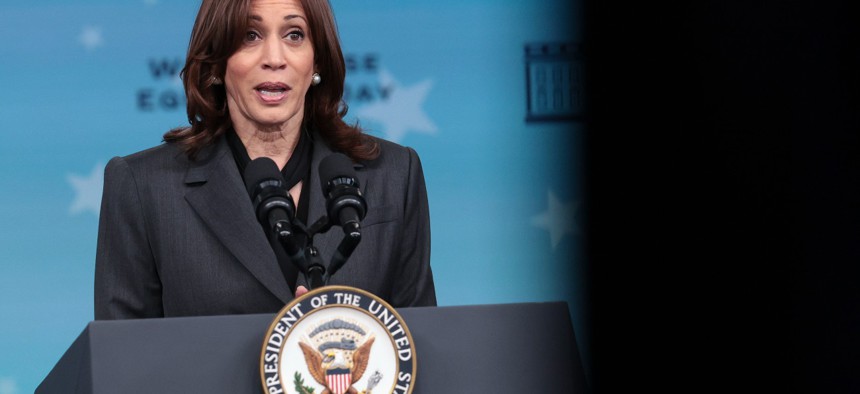
Vice President Kamala Harris speaks during an event with members of the U.S Women's National Soccer Team at the White House complex Tuesday. Harris was speaking about equal pay for equal work. Win McNamee/Getty Images
The White House and OPM Say They Will ‘Address’ Salary History in Federal Hiring
Although the federal gender pay gap is much smaller than the disparity in the private sector, officials vowed to push to eliminate it altogether.
Officials at the Biden administration’s event Tuesday marking Equal Pay Day decried the use of job applicants’ salary histories when hiring workers in both the private sector and the federal government but shied away from overtly promising to ban the practice.
At the event, Vice President Kamala Harris and Office of Personnel Management Director Kiran Ahuja announced that OPM has begun work on proposed regulations that would “address” the use of job applicants’ salary histories in the federal hiring process and that President Biden would sign an executive order Tuesday to discourage their use among federal contractors.
“One factor that contributes to the gender pay gap is the common practice requiring applicants to share their salary history,” Harris said. “[For] many women, this practice can mean inequitable pay from a previous job will follow them to their current job, and so on and so on. So our administration is committed to eliminating discriminatory pay practices that inhibit the economy, efficiency and effectiveness of the federal government, and that’s why today, our Office of Personnel Management will begin work to address the use of salary history in the hiring and pay-setting process for federal employees.”
Ahuja touted the fact that compared to the private sector, where women make 83 cents on average for every dollar men make, the federal government only sees a gender pay gap of under 6%. And in the Senior Executive Service, there is no pay gap across gender lines.
“Any gap is unacceptable, but we’re headed in the right direction,” Ahuja said. “[OPM] is proud to work with partners across the Biden-Harris administration to advance equity and close the pay gap once and for all. We’re collaborating with agencies to evaluate HR practices and implementing pay discrimination prevention tools in line with President Biden’s executive order to promote diversity, equity, inclusion and accessibility in the federal workforce.”
But Ahuja, too, described her agency’s planned regulations as an initiative to “address” the use of salary history in federal hiring, not eliminating it outright. She said those regulations will be released “in the coming year.”
Biden’s executive order on the use of salary history among federal contractors similarly stops short of outright banning the practice, instructing the Federal Acquisition Regulatory Council to “consider whether any such rules should limit or prohibit” its usage by contractors in the hiring process.
Last year, after Biden issued an executive order aimed at improving diversity, equity and inclusion at federal agencies, he instructed OPM to review whether to ban agencies from relying on job applicants’ salary history when setting pay for new hires, but included a potential exception in cases where “the salary history is raised without prompting by the applicant or employee.”
That exception drew the ire of diversity advocacy groups like the DOJ Gender Equity Network, which is composed of around 1,100 Justice Department employees, who argued that the loophole would allow pay disparities to persist because beneficiaries of the pay gap could continue to use their salary histories in new-hire pay negotiations.
Stacey Young, president of the DOJ Gender Equity Network, said in an email that while she is excited that the administration is paying attention to how salary histories lead to inequity in federal compensation, she remains concerned that once unveiled, the regulations won’t go far enough to eliminate the practice.
“I’m thrilled that this administration recognizes that the government, as an employer, should never reward or penalize people based on how much they made in a prior job,” Young said. “DOJ GEN has long fought for this policy because the use of salary history when setting pay disproportionately harms women and people of color. To truly tackle the problem, I hope the regulations make clear that federal agencies cannot use prior salary at all—even if job applicants or new hires volunteer it. Any exception to a complete ban could swallow the rule.”







